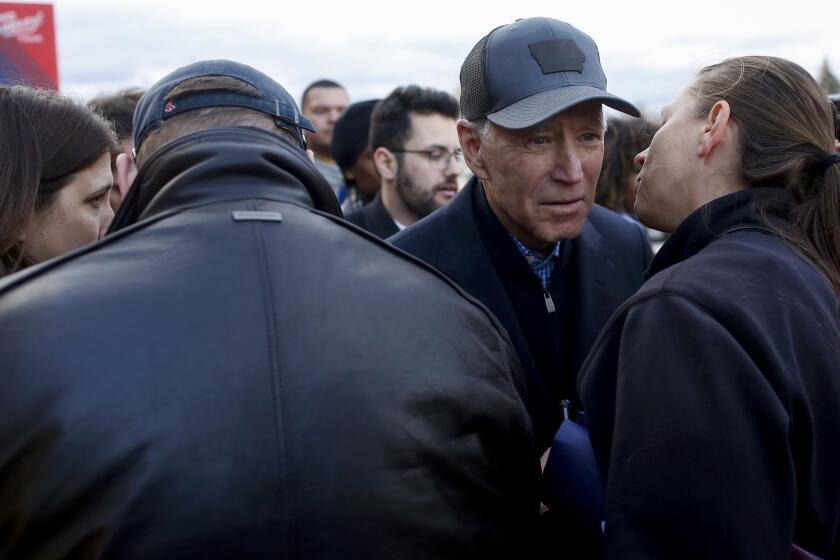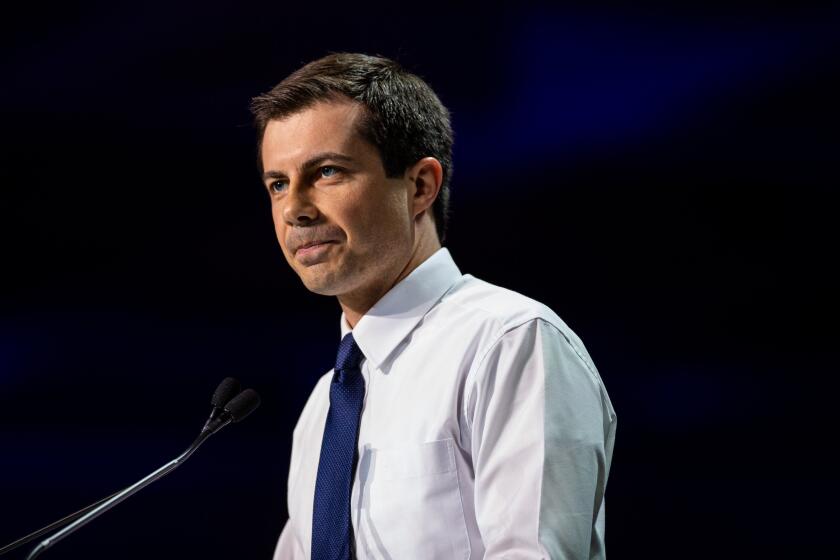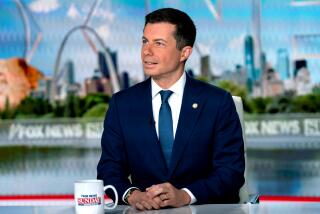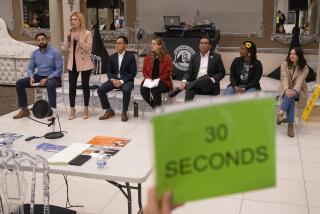Progressive activists have a new punching bag: Pete Buttigieg
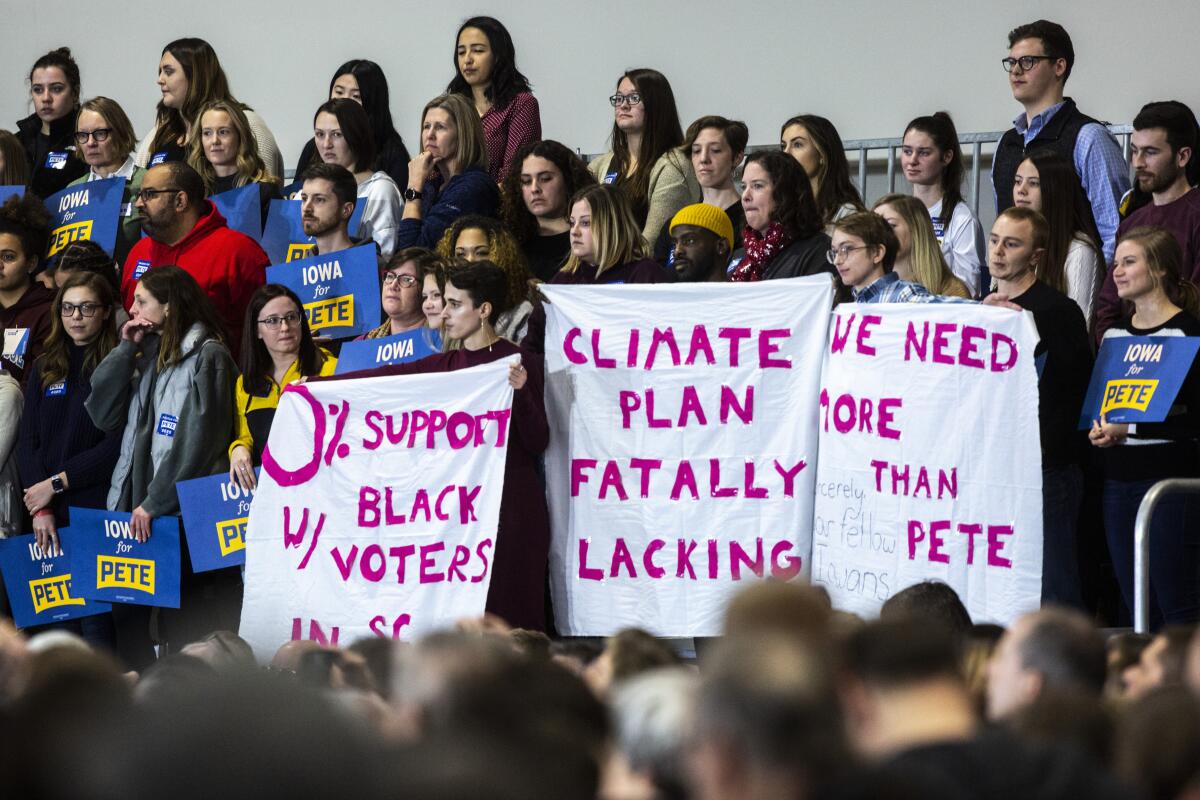
- Share via
SOUTH BEND, Ind. — There’s something about Mayor Pete.
As the Midwestern political upstart climbs in Democratic presidential primary polls, Pete Buttigieg also has managed to get deep under the skin of progressive activists.
Social media networks now light up with the latest Buttigieg-induced controversy over his policy positions, his turns of phrase, even the swanky locales of his private fundraisers. The Gen Z crowd mocks him as “Mayo Pete,” his events have been disrupted by liberal protesters and his fresh-faced newness is seen as a drawback.
The acrimony has spilled over onto the campaign trail with rivals increasingly sniping at Buttigieg by name. On Thursday, six of his opponents will have the chance to level their critiques in person when they share a stage with him at the sixth Democratic debate in Los Angeles.
As a relative unknown, Buttigieg wowed Democrats as an openly gay, multilingual wunderkind with Rust Belt bona fides. But as the novelty of his trajectory — going from a mayor of South Bend, Ind., a city of 100,000 people, to a top-tier presidential candidate — has worn off, a sneering tone among the Democratic left has crept in.
“Of the people at the top of the race ... you have three very accomplished people with gravitas,” said Adam Green, co-founder of the Progressive Change Campaign Committee, an activist group aligned with Massachusetts Sen. Elizabeth Warren. Green was referring to Warren, Sen. Bernie Sanders of Vermont and former Vice President Joe Biden.
“That does not extend to a 37-year-old mayor who won his last race with 8,000 votes.” (Buttigieg won 80% of the roughly 10,500 votes cast in his 2015 reelection.)
Among centrist voters inclined to like Biden, the 37-year-old Buttigieg is becoming plausible as an alternative, and he highlights what Biden is not: energetic, articulate and young.
In a year when Democrats fielded their most diverse slate of candidates ever, some are frustrated by him outperforming women and candidates of color with longer resumes. Compounding that sting is his meager support among black and Latino voters, a core of the Democratic base.
The hype around Buttigieg is “very hard to stomach,” said Aimee Allison, founder of She the People, a group that promotes women of color in politics.
“He’s been given a lot of space,”she said. “We have other candidates who are carrying the hopes and dreams of millions who haven’t been given that.”
Rebecca Katz, founder of the progressive consulting firm New Deal Strategies, put it bluntly: “There is frustration that Pete is the living and breathing embodiment of white male privilege.”
Mainly, progressive complaints about the mayor boil down to a simple refrain: They just don’t trust him.
“Right now, people don’t really know who Pete Buttigieg is,” Katz said. “He’s different at the end of 2019 than he was at the start of 2019.”
Katz pointed to the mayor’s past support for “Medicare for all” as an example. Buttigieg now runs on “Medicare for all who want it,” which would create a government-run public option to compete with private insurers, and has branded Medicare for all as too disruptive and politically toxic.
The tussling over healthcare was the first fissure between Buttigieg and the left. It’s now cracked open into a mile-wide gulf, as the mayor has charted a more moderate course, which he says is necessary to win over the voters needed to beat President Trump.
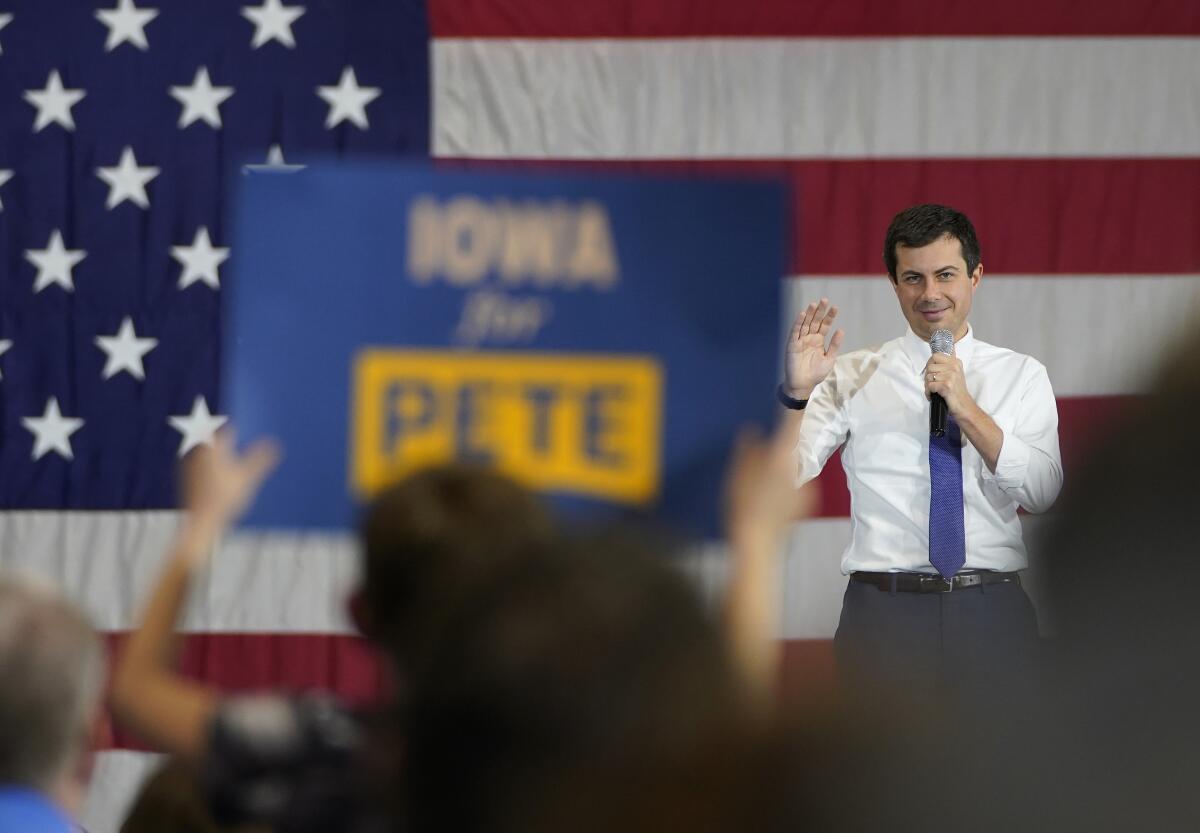
Progressives were enraged when Buttigieg released a commercial that touted his college affordability plan, which would provide tuition-free public higher education for 80% of American families, and panned more sweeping proposals by Warren and Sanders. Buttigieg said making college free “even for the kids of millionaires” amounted to an unrealistic promise. Detractors said Buttigieg was undermining the push for more universal programs, a top progressive priority.
“This is a GOP talking point used to dismantle public systems, & it’s sad to see a Dem candidate adopt it,” tweeted New York Democratic Rep. Alexandria Ocasio-Cortez, a Sanders supporter.
Many on the left also got angry when Buttigieg, responding to a voter question in New Hampshire about the federal deficit, said that his party was “not known for worrying about deficits and the debt too much, but it’s time for us to start getting into that business.” He then went on to slam the GOP for growing the deficit under its watch.
Liberal economist and New York Times columnist Paul Krugman tweeted his dismay, wondering, “Is Buttigieg just Howard Schultz in disguise?” — linking Buttigieg to the ex-Starbucks chief who pondered a third-party centrist bid that was derided by Democrats.
Allison said these more moderate tacks are most galling for progressives, who believe the Trump era demands a forceful, sweeping response.
“His perspective on what the political solution is in this moment is too middle of the road,” she said.
South Bend, Ind., Mayor Pete Buttigieg is fast threatening former Vice President Joe Biden’s dominance of the Democratic primary’s pragmatic lane.
Buttigieg has played down the policy rifts, emphasizing his support for hiking taxes on the wealthy, raising the minimum wage and boosting union membership — all of which have wide-ranging support in the Democratic Party.
“It is a little strange because I think I broadly share the same values and goals as a lot of these folks. It’s a little hard to have a conversation with them, so I don’t know for sure,” Buttigieg said last week in an interview broadcast by the Washington Post.
Aside from the policy squabbles, Buttigieg opponents have dinged him for his ties to corporate America, pressuring him to release his client list when he was a junior employee at McKinsey, a consulting firm, and the names of elite donors who are raising money for him. The mayor disclosed both sets of information last week.
The friction is especially high between Buttigieg and Warren, whose polling numbers have dipped as the mayor’s have risen. In a speech in New Hampshire last week, her criticism was thinly veiled.
“Unlike some candidates for the Democratic nomination, I’m not betting my agenda on the naive hope that if Democrats adopt Republican critiques of progressive policies or make vague calls for unity that somehow the wealthy and well-connected will stand down,” she said.
Buttigieg hit back, alluding to Warren’s history of doing closed-door fundraisers, which she has largely eschewed in this race.
“The thing about these purity tests is the people issuing them can’t even meet them, right?” he said in the Washington Post broadcast. “If doing traditional fundraisers disqualifies you from running for president, then I guess neither one of us would be here.”
Many of Buttigieg’s supporters, and some top aides, are quarreling with critics on Twitter, but a campaign spokesman was more restrained.
“While the attacks from our competitors continue to escalate, Pete’s vision for the future of the country is resonating with voters,” Tess Whittlesey said. “His focus remains on defeating Donald Trump and uniting the country by offering bold solutions to the challenges our country faces.”
The good news for Buttigieg, perhaps, is that he’s been here before. Nanci Flores, a supporter who works at a Latino community center in South Bend, recalled that the mayor’s youth initially led to some skepticism.
“When he first started as mayor here, people were not really taking him seriously. We really didn’t know him,” Flores said. “But it only took a year to get to know that this guy was serious and he was effective and he cares.”
Nowadays, there are signs that the anti-Buttigieg rhetoric is distinctly more mellow on the ground in Iowa, even among backers of rival campaigns. Some, like Nate Rivers, who attended a Sanders town hall in Iowa Falls, echoed many of the progressive concerns.
“A lot of the backlash is about him being a guy who was like, ‘I will support Medicare for all’ to where he is now, basically a debate assassin trying to shoot down progressive talking points,” said Rivers, a 20-year-old student at the University of St. Thomas in Minnesota.
Others reacted to Buttigieg with more of a shrug. Laura Foley, 37, attending a Sanders canvassing event in Des Moines, said she had no problem with the mayor.
“He’s a great person,” Foley said, “and I hope the best for him.”
Times staff writer Evan Halper contributed to this report from Iowa.
More to Read
Get the L.A. Times Politics newsletter
Deeply reported insights into legislation, politics and policy from Sacramento, Washington and beyond. In your inbox three times per week.
You may occasionally receive promotional content from the Los Angeles Times.
